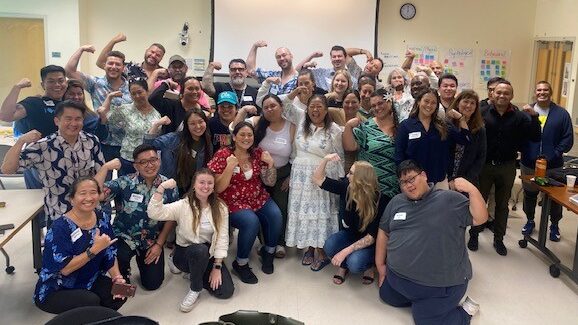Capacity Building Assistance
We strengthen the HIV prevention workforce in the West region of the United States to end the HIV epidemic.

CAPTC provides technical assistance (TA) by assessing and responding to the strengths and needs of local, state, and national health agencies. We create tailored plans to build agencies’ capacity to best serve their diverse communities. We seek to address the root causes of health disparities fueling HIV/AIDS – like stigma, discrimination, transphobia, and structural racism. Our team facilitates opportunities for learners to work through their unconscious bias and internalized stigmas to create more equitable systems and provide more compassionate HIV care.
Our Capacity Building Assistance (CBA) Program
CAPTC’s CBA program provides capacity building to health organizations in the West region of the United States. We are funded by the Centers for Disease Control and Prevention (CDC) to support the national Ending the HIV Epidemic (EHE) initiative. Our free (not for fee) CBA services and resources are available for CDC-funded health departments, CBOs, and their local partners seeking to optimally plan, integrate, implement, and sustain comprehensive HIV prevention programs and services. We provide a wide range of services tailored to staff and/or organizations’ specific needs:
- Condom distribution
- Data to care strategies (including pharmacy data to HIV care)
- HIV/HCV transmission clusters and outbreak response
- Integrated HIV prevention and care planning
- Strategic communications around HIV prevention, treatment, and care
- Partner services
- Social determinants of health
- Status neutral approaches
- Syringe services programs
Technical assistance is structured around the four pillars of Ending the HIV Epidemic (EHE): diagnose, treat, protect, and respond. The EHE initiative provides the hardest hit communities with the additional expertise, technology, and resources required to end the HIV epidemic.

High Impact Prevention with CAI
CAPTC partners with Cicatelli Associates Inc. (CAI) to deliver High Impact Prevention (HIP) strategies training throughout the country. Funded by the CDC, HIP strategies are a set of evidence-based interventions and approaches for preventing HIV transmission and reducing the burden of HIV/AIDS. HIP strategies include an effective combination of biomedical, behavioral, and structural interventions.
Called upon for our experience and expertise, we deliver high-quality training to build capacity and to support the implementation of HIP strategies. CAPTC staff facilitate evidence-based interventions and public health strategy sessions with health jurisdictions across the country.
Resources and Capacity Building Assistance
Explore these and other online learning opportunities from the rest of the CAPTC’s programs in our Online Learning database.












